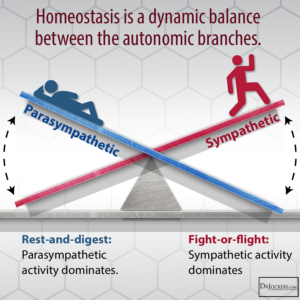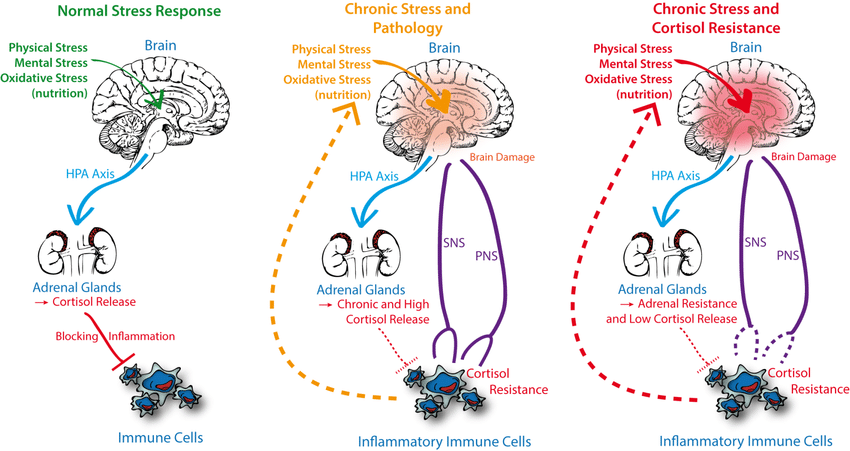
The Physiology of Stress
Most of us tend to externalize stress. We see stress as something that exists externally. For instance, it is common to say: ‘That was a stressful situation’, or ‘this event is going to be stressful’, etc. Stress is first and foremost a physiological reaction to external stimulus. Stress does not exist in the situation or circumstance that is outside of us. Stress lies in the patterns of behavior developed over a lifetime to certain situations and circumstances. Stress is also a result of a lifestyle that is unplanned. To explain stress as a physiological reaction, I will first have to begin by explaining the nervous system.
The nervous system comprises two main branches; the central nervous system (CNS) and the peripheral nervous system. The central nervous system resides in the brain and the spinal cord. The peripheral nervous system is composed of the nerves that extend to all peripheries of the body. The peripheral nervous system is further subdivided into the somatic and autonomic branches. The Somatic branch is responsible for all our sensori-motor functions. The autonomic, as the name suggests, is responsible for all the so called automatic processes within the body; the pumping of the heart, the breath rate, functioning of the organs, production of hormones and so on. The autonomic system is further subdivided into two branches. The sympathetic (fight or flight) and the para-sympathetic (rest and digest). I will now explain these two branches in detail.
 The sympathetic and para-sympathetic branches are meant to work in a cyclical fashion. This means that a fight or flight activation of the nervous system must be followed by a period of rest and digest, for the nervous system to function at its optimum. Let’s think of this in context of the lifestyle that our hunter-gatherer ancestors had. This is important because their lifestyle is the reason our nervous system is the way it is today. Leveraging an understanding of the evolutionary process of the nervous system can help us live more fulfilling lives today. Our ancestors lived in a world fraught with danger. They could be attacked and killed by other wild animals, and had to often protect themselves from neighbouring tribes as well. In these situations of danger, the sympathetic (fight or flight) branch of the nervous system is activated. This in turn activates the endocrine system in numerous ways. When we are in a state of danger, the body limits the energy being used for digestion and instead diverts this energy to the muscles and brain. This is so that we can either fight or run. The thyroid gland is suppressed and the production of thyroid hormones is paused. The adrenal gland is stimulated and the hormones adrenaline and cortisol (the stress hormone) are produced. These hormones bring us into a state of high alertness, so that we can act quickly to ensure our survival. Once these dangers passed, and if we did survive them, the tribe would take time to relax, recuperate. This would allow for the parasympathetic response to take over, diverting energy back towards digestion and other physiological processes related to recovering and balancing the internal and external systems of the body.
The sympathetic and para-sympathetic branches are meant to work in a cyclical fashion. This means that a fight or flight activation of the nervous system must be followed by a period of rest and digest, for the nervous system to function at its optimum. Let’s think of this in context of the lifestyle that our hunter-gatherer ancestors had. This is important because their lifestyle is the reason our nervous system is the way it is today. Leveraging an understanding of the evolutionary process of the nervous system can help us live more fulfilling lives today. Our ancestors lived in a world fraught with danger. They could be attacked and killed by other wild animals, and had to often protect themselves from neighbouring tribes as well. In these situations of danger, the sympathetic (fight or flight) branch of the nervous system is activated. This in turn activates the endocrine system in numerous ways. When we are in a state of danger, the body limits the energy being used for digestion and instead diverts this energy to the muscles and brain. This is so that we can either fight or run. The thyroid gland is suppressed and the production of thyroid hormones is paused. The adrenal gland is stimulated and the hormones adrenaline and cortisol (the stress hormone) are produced. These hormones bring us into a state of high alertness, so that we can act quickly to ensure our survival. Once these dangers passed, and if we did survive them, the tribe would take time to relax, recuperate. This would allow for the parasympathetic response to take over, diverting energy back towards digestion and other physiological processes related to recovering and balancing the internal and external systems of the body.
 In our modern lifestyles, we are constantly , chronically activating a sympathetic (fight or flight) response. If we feel tired or groggy, we drink a coffee, smoke a cigarette, or resort to other kinds of stimulants. These stimulants are stimulating the nervous system. When this happens constantly, for hours in a day, without respite afterwards, we commonly call it chronic stress. Watching a movie, or news, or playing video games are all stimulating activities that don’t allow our nervous system to calm down after a full day of being in a high alert response. When this happens for weeks, months, and years, we eventually face what is known as adrenal fatigue. Our adrenal glands become tired from being constantly put to work. This might be experienced as: “us reaching out for our third cup of coffee at 11.30 am, and still feeling groggy after”. The stimulants that we consume in this chronic state of fatigue or stress, is pushing the adrenals to borrow energy from our future. We are literally reducing the years of our life in this way.
In our modern lifestyles, we are constantly , chronically activating a sympathetic (fight or flight) response. If we feel tired or groggy, we drink a coffee, smoke a cigarette, or resort to other kinds of stimulants. These stimulants are stimulating the nervous system. When this happens constantly, for hours in a day, without respite afterwards, we commonly call it chronic stress. Watching a movie, or news, or playing video games are all stimulating activities that don’t allow our nervous system to calm down after a full day of being in a high alert response. When this happens for weeks, months, and years, we eventually face what is known as adrenal fatigue. Our adrenal glands become tired from being constantly put to work. This might be experienced as: “us reaching out for our third cup of coffee at 11.30 am, and still feeling groggy after”. The stimulants that we consume in this chronic state of fatigue or stress, is pushing the adrenals to borrow energy from our future. We are literally reducing the years of our life in this way.
Additionally, to add fuel to the fire, most of us in this state, live sedentary lifestyles. All those moments that elicit a stress response within us, divert energy to our muscles, even when those muscles are never used. Usually it is the spine that suffers most because of this. When the fight or flight response builds up in the spine, it needs to be released. We have evolved to release this in the past by running or fighting our adversaries. Today, most of us are keeping this pent up energy, released by stress in our necks or lower back. The spine must move when it is in a state of stress. This is how we have evolved. There is no way around it. Next time you feel stressed, make sure you do a small dance or movement to release that energy from your system. This is why yoga and other movement practices are great stress busters. Additionally, meditation or pranayama (breath-work) are great ways to activate the para-sympathetic (rest and digest) response to counter the fight or flight dominated lives we live. Even doing art, playing music or anything that allows us to relax, while going into a state of flow are invaluable tools that we must make a part of our daily routine.
One of the main purposes of any spiritual practice is to become a master of the nervous system. Once we can control its workings, we can control whether or not we elicit a stress response to certain situations. We might still live the same lives, with the same conditions and situations, but the stress response elicited by our nervous system is reduced. We are more in control of our reactions to the world around us. There is a space created between us and the stories of our life. Stress doesn’t go away by changing the circumstances of our life. It goes away when we learn to control how our nervous system reacts to situations that we find ourselves in.
